Welcome to The Oldster Magazine podcast. This first episode, editor Sari Botton chats with Jennifer Pastiloff—author of the inspirational memoir, On Being Human—about her progressive hearing loss and how she’s grappling with it at 47—including shedding the shame she once associated with it.
You can listen to the conversation above, and/or read a condensed, much edited transcript below.
Sari Botton: Today I have with me author, public speaker, yoga teacher, and so much more, Jennifer Pastiloff, whose memoir, On Being Human, is described by Cheryl Strayed as, "Beautiful and tender, profound, and adsorbing." Welcome, Jennifer.
Jennifer Pastiloff: Thank you. It's so good to be with you. I'm such a fan. I'm happy to be here.
SB: So, I can think of roughly nine million reasons to interview you. But today I want to focus on an aspect of your life that I think will resonate a lot with Oldster Magazine readers, and that is progressive hearing loss. You're in your forties, and I think most people associate major, progressive hearing loss with people much older. So how old are you now? And how old were you when you started to lose your hearing?
JP: I just turned 47.
SB: Happy belated birthday! How old were you when the hearing loss started to happen?
My hearing loss is so largely dialed in with my father-loss. I became a master at denial, and at disassociation, and disconnect.
JP: That's a complicated question. I don't know. It definitely 100% was not like it is now when I was a child, but I always had it. I had chronic ear infections. And when I say I was on antibiotics every day of my life until my teens, I really was. Chronic ear infections almost every other week. On top of my hearing loss, I have tinnitus. It is so maddening. It's torture, truly.
I remember as a child—and it was before my dad died, so let's call me 6—whenever I'd color, concentrate, write, I would make this awful noise, this sort of droning noise. People made fun of me, and they were like, "Why do you do that?" I got ashamed and I locked it back in my body, and I never did that again. I just kept it in my head.
My hearing loss is so largely dialed in with my father-loss. I became a master at denial, and at disassociation, and disconnect.
As I got into my early twenties, when I was in acting school—when I was pretending to be an actor—that's when I really started to notice it. And I would have to sit in the front row with the teacher. And then I'd think back to being in college at NYU, always having to sit in the front row. I'd think, I always have to sit in the front row. Always being told I don't pay attention my whole life, that I'm a space cadet. I swiftly pushed it away because it terrified me. And I thought, If I acknowledge this, it's going to make it real. And if I don't, it'll go away. Spoiler alert!
I waited tables and that's where I really mastered the art of reading lips. I would squat down and talk to people.
SB: I think a lot of us can relate to that feeling of, "Oh, let me put this aside and maybe it'll disappear."
JP: I couldn't do that now, at 47. My hearing loss is so profound now, but at 20, 22 years old, I made excuses all the time. "Oh, I have a cold. I'm congested." I was so ashamed. I thought there was something deeply wrong with me. I thought that it was my fault. My father died and I was a bad person. And on top of that, now I'm broken and there's something wrong with me.
And also, there was such a stigma with hearing loss. There isn't with vision, right? I was like, "No way—I'm not going to wear those big hearing aids, and I'm not deaf." So I kept pretending.
And then, I waited tables and that's where I really mastered the art of reading lips. I would squat down and talk to people. I have a personality that's really friendly. I'm really open. There were so many ways I could cover it up. The acoustics are so bad in here. And then it got to the point where finally I couldn't pretend anymore.
Jennifer Pastiloff getting her new ResoundOne hearing aids.
SB: How old were you when you couldn't pretend anymore, and you realized that you needed to have some sort of intervention?
JP: I was probably 22. And that's what breaks my heart. I think about all those years of the exhaustion of trying to pretend to hear, of not hearing, of people thinking I was stupid. It was finally when I went to a yoga teacher training, even though I'd never really wanted to be a yoga teacher, but I had gone on antidepressants and I thought, Okay, this might be a way out of the restaurant that I've been at for 14 years. And the teacher would say, "Close your eyes for these meditations." And it was the first time I ever said out loud, "I can't hear if I close my eyes.”
Let's call it 33 years old. I was like, Oh, my, I said it out loud. And I didn't die. And then the teacher began to take really good care of me and she'd always make sure I was in the front. But it was funny, she made this comment, "Oh, that's why you're always looking at me like..." and she imitated me in a way. I would get that a lot. When I would then run into people, once I said, "I have hearing loss," they’d go, "Oh, we always just thought you were an airhead. "
The yoga teacher would say, "Close your eyes for these meditations." And it was the first time I ever said out loud, "I can't hear if I close my eyes.”
SB: You've posted a lot about how right now COVID makes it extra challenging for you, because people are wearing masks and you can't read their lips.
JP: Oh, it's a level of hell. We need the masks. I get used to it. We can get used to anything, like how I got used to essentially just being underwater and not knowing what was going on, and somehow compensating. And finally I wrote a blog post admitting I have hearing loss. I went to the audiologist and it was basically like, "Girl, you're at like 15%." I mean, how am I functioning? And I wrote a blog saying like, "Okay, well, I'm finally ready to not be ashamed and admit it, but can't afford hearing aids."
SB: How old were you then?
JP: 34, I think. And I was teaching yoga at this place in West Hollywood at the time, and there was a woman who came, who I thought hated me. Because it's all about me. And she would sit on her mat and read the paper before class. And I made up a story about her. And she somehow had my phone number. She read the blog and within like a second of it being published, she calls me. And she goes, "Jennifer." I said, "Yeah?" I said, "Who is this?" She tells me, and I'm like, "The lady who hates me?" She said, "What are you doing right now? I want you to go to this address in Beverly Hills. I have a pair of hearing aids for you. My friend's an audiologist. They're being donated to you. Go get them."
And I mean, first of all, I was like, Oh wow, the stories we make up. This woman's amazing. And then, I got these hearing aids. They weren't right for me, but they worked a bit and my whole life changed. It's heartbreaking. It is. It's beautiful, but man, why didn't I do that sooner? Same with antidepressants. Shame held me back.
The woman said, "What are you doing right now? I want you to go to this address in Beverly Hills. I have a pair of hearing aids for you. My friend's an audiologist. They're being donated to you. Go get them."
SB: You talk so much about shame and shame loss. In your book you talk about how long you tried to hide your hearing loss and your depression and other aspects of yourself. But then you started to open up and people responded and things shifted for you. Can you talk about how the shame loss relates to deafness?
JP: Yes. I also want to say, this is a very unique moment because I just got new hearing aids, and they're good. But they're loud. In the past I have never been able to do Zoom on the computer. I have to usually use my phone because then it streams through the hearing aids. So right now, I'm just listening through the computer because these are so good, so loud, and it's just wild. These are great hearing aids. So after shame loss, I have to tell you about how I got these.
SB: Yes, yes.
JP: So, I nearly died from anorexia. I never processed my grief over my dad. I found a way to manage, and it almost killed me.
At the beginning of COVID, I had kind of a breakdown, because all my work had been in person. And I was on the phone with a friend of mine who I’d just returned from visiting in New Jersey. And she said to me, "Why don't you start ‘shame loss’? Instead of weight loss, shame loss." And I was like, "That is such a great idea." She said, "Well, I just thought of the name, but it's what you've been doing for years, Jen."
And I thought, Okay, I'll accept it. Then I thought, I'm sure someone has that URL, shameloss.com, but no one did, and I bought it. And I started thinking about the magnitude of being able to say, "Fuck weight loss. Let's talk shame loss."
A big theme I work on is being “right on time,” because I always thought I was late. I was behind. But so much of my life, I don't want to say was wasted because it wasn't wasted, but was blunted by shame. Before my father died, the last conversation we had, he said, "You're being bad and making me not feel good." And I said, "I hate you." That's the last exchange—8 years old. So naturally it's like, I'm bad. That became my mantra. I'm a bad person. I killed him.
A big theme I work on is being “right on time,” because I always thought I was late. I was behind. But so much of my life, I don't want to say was wasted because it wasn't wasted, but was blunted by shame.
And then everything onward was about hiding and feeling like a bad person. So when I get to NYU and I'm writing all these poems and then I end up essentially dropping out and becoming a career waitress for 14 years at the same joint, every day it was about shame. Not that there's shame in serving, but I'm an artist. I wasn't creating. I literally was a walking dead person. And it wasn't until I finally began to talk about it that I realized I wouldn't die, first of all, if I talked about it. That I wouldn't get left. And in fact quite the opposite would happen, and that sharing our stories has the power to heal other people.
I also realized shame isn't logical. So when people are like, "I don't understand. Why would you be ashamed of hearing loss?" Like, well... A) shame isn't logical, and B) because I thought something was wrong with me. When I had this breakdown I thought, "Well, how did I get here? I wrote a bestselling book and I teach thousands of people, and blah blah." Because everything's about daily practices, right? I end On Being Human with the two words I say every day. “Now, what?”
So it's not like, Okay, I let go of shame over my hearing loss. And that's that. It's every day. Every day it's choosing to put it down. And so with the idea of shame loss, it's naming it, it's sharing it with people. And really the big thing, for me, it's not that about oversharing. It's not like vomiting my everything to everyone. It's I won't hide in shame. I just won't. Will not, ever.
SB: I admire that. That's amazing. One of the things you also talk about in your book is “radical listening.” Something that you've had to develop because of your hearing loss. And in a way it almost makes hearing loss seem like a gift. Can you talk about that connection?
JP: Oh, yeah. It is. In my book, I talk about how when I broke my foot and I was really upset and I was at the ER and I posted, someone was like, "This is a gift. This is your yoga." And I was like, "You can fuck off." You don't immediately go to, This is a gift.
Pre-COVID, and pre- these really great hearing aids, I used my yoga workshop sort of as a trick to get people in the room. I use that as a way to get people to get in their bodies, and to connect. But people would share, and I couldn't hear, so essentially I'd have to go sit in their lap, and that was my joke. I wasn't in their lap, but I was really in your face, which is amazing and terrifying.
And it's amazing because you feel so heard and seen. And most people don't have that. It wasn't because I was like trying to be like, "Look at me, I'm listening." I couldn't hear, unless I really got close. I still usually would have a translator. I'd have someone next to me, and I'd go, "What did they say?" I'm like my old Jewish grandmother. What did they say? But I was so close to them. And so just fully attentive.
People are not used to being so heard and seen. So I say, "I'm the best listener you know. Even though I'm deaf." Because I've had to learn how to listen with my entire body. I still do.
Especially as I've gotten older, I've learned so many ways to listen beyond just my ears. Which we all have the capability for. I've just had to develop it more and more and more because these motherfuckers don't work so well. And when I don't have my hearing aids in, I can't hear anything.
People are like, "I don't understand. Why would you be ashamed of hearing loss?" Like, well... A) shame isn't logical, and B) because I thought something was wrong with me.
SB: So you are experiencing severe hearing loss at a much younger age than most people. Oldster is all about the incongruity between chronological age and our actual experiences and all the expectations...
JP: The what? Wait. I didn't hear the word. The what?
SB: The incongruity.
JP: Got it.
SB: Between our chronological age and what we've been told will happen to us at a certain time, and what our actual experience is. So, what is it like for you to be having this experience that most people have much later in life?
JP: First of all, when I asked you to repeat the word, thank you for just repeating it! Because nine times out of ten what people do? They define it and I'm like, "I'm not stupid. I'm just deaf." I know what incongruity is! I just didn't hear you. So that's frustrating.
I also understand that I don't present like a deaf person with a capital D, and let's clarify that. Capital Deaf, deaf culture, born deaf, or maybe not even born deaf, but no sound usually, don't wear hearing aids, communicate with ASL. And it's like a whole culture. And I don't know ASL. I want to. But then if you spend time with me in person, you're like, Oh.
Most people lose their hearing in their eighties and nineties, and mine went, who knows when? Right? And so it is. I think that's really important because that is what shame loss is. I used to pretend. Even when I was, let's say, 37 years old. I mean, even up until 40, I would pretend. I would be in a conversation and I would miss a lot of it. And then I asked the wrong questions. It’s so nonsensical, and now I lead with the thing that causes me shame. Right off the bat I'll go, "By the way, I'm deaf. I read lips." So there's no pretending. I don't have to go through all that. And there's no shame there.
But I'm 47 years old. I'm here now. My hope is with shame loss, with the work I do, maybe someone will get there earlier. I have these teens and twentysomethings that follow me that just had to get hearing aids. And they said they got them because of me. It's so exciting. I think, "Oh, if I had someone like me, maybe I wouldn't have left school. Maybe I wouldn't have stayed stuck for so long because I was so ashamed, and just was immobilized."
People are not used to being so heard and seen. So I say, "I'm the best listener you know. Even though I'm deaf." Because I've had to learn how to listen with my entire body.
SB: That's beautiful. Let's talk about these hearing aids. I know you've tried many different kinds over the years. What is it about these? And let's talk about them.
JP: Well, actually I haven't tried many different kinds. I got those first ones that were donated and looking back, they were awful. I mean, they were fine, but they were for like an old man who died, who never used them. And at the time, I had no money, and hearing aids are so expensive.
I've only had three pairs. I lost the first pair. And I got a new pair. Someone started me a GoFundMe. Let's talk about shame again. I was like, I could never. Especially because I was perceived as someone who was successful and I had a lot of followers, the douchiest word in the world. And so, it's like, Well, how could I? What are people going to think?
It was humbling. I accepted it and I got these hearing aids. I got them when I was pregnant and they changed my life. They were made for, for me. I went to the audiologist, and they were great. And all of a sudden, they had technology the other ones didn't have, where they'd stream.
So the other ones I thought were great. They were expensive. I think I paid $9,000. So many people donated to the GoFundMe in the quickest amount of time. And it was really humbling. I have one tattoo—bad Jew—that says, "I got you." But it's the "I got you" effect.
The GoFundMe was humbling, because all these people donated. And I was like, Look at all these people that care about me! And I realized this work I had been doing—I had started sharing essays and doing a lot of work that is the work I'm doing now—is very much about community and being of service. And I watched it come back to me. Like in a minute, basically like $9,000.
SB: How old were you then? Your son is how old now?
Now I lead with the thing that causes me shame. Right off the bat I'll go, "By the way, I'm deaf. I read lips." So there's no pretending. I don't have to go through all that. And there's no shame there…I'm 47 years old. I'm here now. My hope is with shame loss, with the work I do, maybe someone will get there earlier.
JP: My son's going to be 6 in May. Let's say 39, 40, because I was pregnant when I was 40. I was an Oldster. So I got these hearing aids and my life changed. And I had a lot of moments of sadness, because I realized how much I had missed.
SB: But then you got another pair recently, right?
JP: So, hearing aids don't last that long. A few months ago I thought, Oh no, I'm going to need to get new hearing aids soon. These are like now six years old. They're getting old. I was like, Great, what am I going to do? I don't have just nine grand sitting at a bank. And I get an email forwarded to me from Maya Ziv, who was my editor for On Being Human at Dutton, at Penguin. It was from a hearing aid company looking to connect with me. It was basically an offer to be an influencer for hearing aids. I'm like, "I'll take the call!" They were in London.
They were like, "Well, we're going to like fly out and fit you. We're going to get you hearing aids." I'm like, "Wait, what?" I mean, I literally had just said it a few weeks before. I was looking around. I'm like, "Am I on Candid Camera?" These are like $6,500. That's I think the price. And they paid me. I negotiated a fee, which by the way, very typical to me, I still haven't sent an invoice in. I don't know anyone else that operates like me. But it was like magic. I was like, "Are you joking? I mean, are you joking?" And also, what a travesty that they're not more accessible. But, basically, I'm an influencer. So I got these hearing aids and they paid me, and gave me these hearing aids to promote them.
They're great. They're called ReSound One. At first, it was hard. They were so much louder than my other ones. Now I've gotten used to this, but, like, I heard my son's voice for the first time. It's levels of, like, how was I existing? I don't think I'd ever heard my son's voice.
SB: Wow. By the way, people can see your son on your wonderful Instagram account. I love watching Charlie dance. He is such an upbeat presence.
I have these teens and twentysomethings that follow me that just had to get hearing aids. And they said they got them because of me…I think, "Oh, if I had someone like me, maybe I wouldn't have left school. Maybe I wouldn't have stayed stuck for so long because I was so ashamed, and just was immobilized."
JP: He's my daddy. I swear, my dad sent him. That's another thing, re: Oldster. I didn't think I was going to have kids. But thank God, I'm so glad I did. I can't imagine my life without him, but I was confident before my life would be as fulfilling whether I had children or not. Now, it's almost impossible to say that because he's here. " But when I had him, I was 41.
SB: Well, if you're doing things at the “wrong” time, you're doing them in the right time for Oldster. That's how I see things, because I've never done anything at the right time in my life. It's probably why I started this.
JP: Me neither. Literally.
SB: And I love that you became a mom later in life and you're able to appreciate it in ways that you might not have been if it happened earlier.
JP: I'm a way better mom. I mean, there's regrets. I do my best to live a life with no regrets.
SB: So, let me ask you a question. If a genie came up to you and offered you the opportunity to no longer have hearing loss, would you take them up on it?
JP: God dammit. No one's ever asked me that. Sorry. Wow. Jesus Christ. Why is that such a hard question? Makes me want to cry.
SB: It's such an essential part of who you are and the work that you do, the deep listening.
“Should” is an asshole. “You should have kids by 36.” “You should have a college degree.” No.
JP: If you asked me that on a day when my inner asshole was raging and I was feeling sorry for myself because my tinnitus was even worse, because it vacillates in how bad it is, then I would be like, "Yeah." But at where I stand now, where I sit on my floor in my forties, no, because you're right. I think so many of the gifts in my life have come from that. And I'm saying that from a place of hindsight, not any kind of bypassing or toxic positivity.
So, no, I don't think so. And I don't say this because there's anything obviously wrong with being deaf. But my fear is one day it'll go completely. Like all sound will go. And the thing is if you know ASL and you have a community, that's different. But, no. I have other things I'd asked the genie for.
SB: So what is up next for you? I know you're working on a new book.
JP: Yes. I'm working on a new book and I just had lunch with my editor. We’re trying to hammer what that is at the moment. It’s about a lot of the things we've talked about here, putting down shame and being right on time. And quieting the inner asshole.
SB: Love it.
JP: “Should” is an asshole. You should have kids by 36. You should have a college degree. No.
SB: Aging is very clarifying. It really helps you narrow down who you are and who you aren't. It becomes harder and harder to pretend you are someone that you're not, which is really liberating, I find.
JP: My dad died when he was 38. So you can imagine the complications I have around aging. I used to always talked about all the time, "38 was the age of death." I'm nine years older now than my dad ever got to be. It’s something I grapple with every day. I still have a very hard time visualizing the future. I got stunted when I was 8 and I'm working every day in my life too, but it's hard to visualize the future. And so I never planned for anything. And that's part of the reason that things happen for me the way they do, "later."
SB: Well, thank you so much for making time to speak with me today, Jennifer. I look forward to all your new developments.
JP: Thank you!


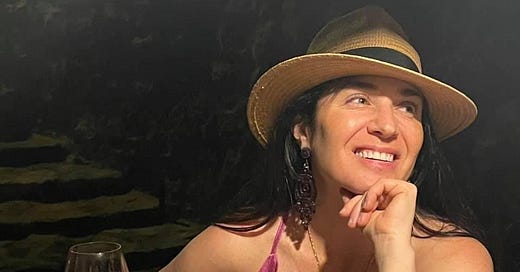

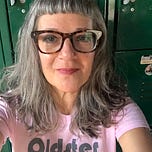


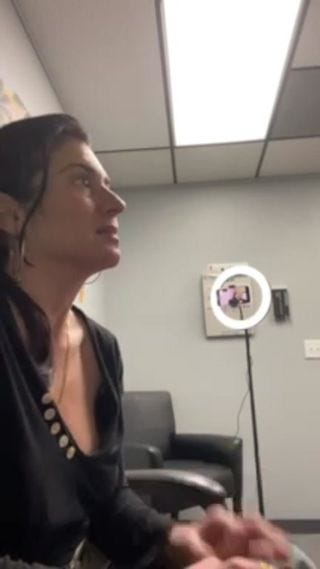
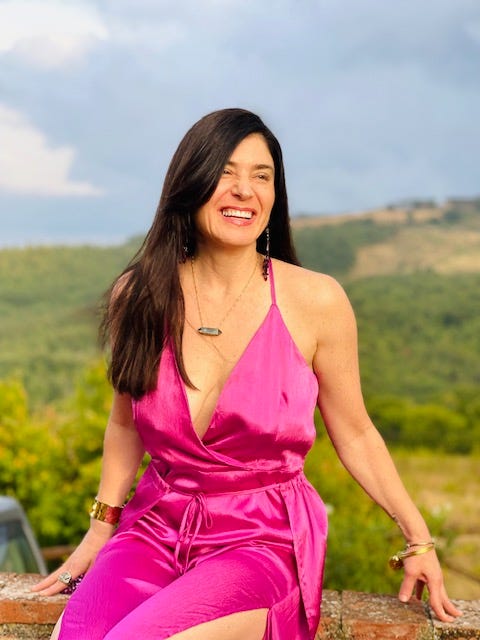


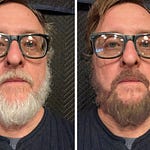
Share this post